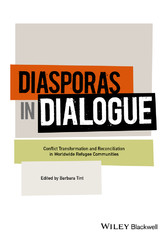Suchen und Finden
Diasporas in Dialogue - Conflict Transformation and Reconciliation in Worldwide Refugee Communities
Mehr zum Inhalt

Diasporas in Dialogue - Conflict Transformation and Reconciliation in Worldwide Refugee Communities
Diasporas in Dialogue is an indispensable guide for those leading or participating in dialogue processes, especially in ethnically diverse communities. The text offers both a theoretical and practical framework for dialogue, providing insight into the needs, assets and challenges of working in this capacity.
- The first book to offer structured processes for dialogue with refugee communities - demonstrates how diaspora communities can be engaged in dialogue that heals, reconciles and builds peace
- Relates the story of the Portland Diaspora Dialogue Project, a remarkable collaboration between university researchers and African community activists committed to helping newly arrived refugees
- Written accessibly to provide practitioners, academics, and community members with a simple and cogent account of how, step by step, the process of healing communities and re-building can begin
Published at a critical time in the face of the worldwide refugee crisis, and offers helpful frameworks and practical tools for dialogue in situations where individuals and communities are displaced
Barbara Tint is Professor of Conflict Resolution at Portland State University and an international trainer, consultant, and facilitator. She travels globally training groups in issues of dialogue, status and power, intercultural relations, leadership, gender dynamics, and resilience. She has published widely in multiple books and journals on these topics. She has facilitated dialogue processes with Jewish Israelis and Palestinians, mixed race groups in the US, Tamil and Sinhalese community members in Sri Lanka, white and Aboriginal Australians, mixed gender groups and with refugee communities from Africa.
Alle Preise verstehen sich inklusive der gesetzlichen MwSt.












